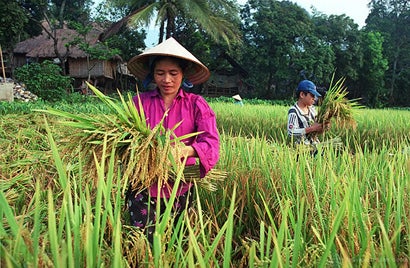 As the 15th Annual World Bank Land and Poverty conference convenes in Washington, DC, this week, it is clear that the effective governance and use of land have profound implications for many of the global challenges we face today – from managing rapid urbanization to creating jobs, stimulating investment, ensuring food security, supporting climate smart agriculture, and enhancing transparency.
As the 15th Annual World Bank Land and Poverty conference convenes in Washington, DC, this week, it is clear that the effective governance and use of land have profound implications for many of the global challenges we face today – from managing rapid urbanization to creating jobs, stimulating investment, ensuring food security, supporting climate smart agriculture, and enhancing transparency.
To contribute to this global conversation, the World Bank Group and UNCTAD have prepared a joint report, The Practice of Responsible Investment Principles in Larger-Scale Agricultural Investments, which analyzes the impact of larger scale agribusiness investments – especially on local populations.
This research adds empirical knowledge to a debate that has largely been fueled by anecdotes and one-off case studies.
We examined 39 mature agribusiness investments in Africa and Southeast Asia (of which, one was an IFC investment), and assessed to what extent their activities can be characterized as responsible in terms of respect for local rights, consultation and transparency with stakeholders, support of livelihoods, environmental sustainability, and other criteria. More than 500 community stakeholders were interviewed, in a way that allowed them to provide their own emphasis on the positive and negative the impacts the investments had on those they represented.
The consultation process provided these local communities with a voice, and we found that investors and national governments were clearly interested in listening. Public officials and investors were eager for practical information generated from real life examples about best practices and pitfalls to avoid. The impressions and ideas of local communities have enriched this study, and provided unique insights into the various factors at play and their impact on those most directly affected by outside investments.
While the findings varied considerably between projects, on balance, we found that the investments studied have generated positive socio-economic benefits for surrounding communities and host countries. Job creation was the most frequently cited benefit, and the resultant rises in rural incomes contributed positively to food security. These larger scale investments created markets for local producers’ crops and resulted in improvements in infrastructure.
That said, the most negative impacts – by far - were disputes over access to land, particularly conflict between the formal rights provided to the investor and the informal rights of existing users of the land. Resettlement was often not sufficiently consultative, inclusive or compensatory, and local communities lacked the mechanisms to raise grievances, or hold investors to account.
Perhaps most importantly, the study generated a number of key lessons. In particular, the analysis emphasized the importance of early stage engagements with local communities – including explicit agreements with investors for social or financially inclusive business models; the need to publicize information on terms and process of land acquisition; and the importance of establishing grievance and redress mechanisms.
This is precisely why we are strong advocates of transparency and fostering more open resource government. We are working with the G8 on a transparency initiative to build the capacity of governments to adopt and implement more transparency, whether on data, tax and trade policies, or land and extractives transactions. Making basic information about such transactions public will benefit everyone.
It is essential to keep this conversation moving. Every year, the Land and Poverty conference brings together representatives from governments, civil society, academia, the development community, and the private sector to discuss issues of concern to communities, land practitioners and policymakers worldwide. The conference fosters dialogue and the sharing of best practices on the diversity of reforms, approaches and experiences that are being implemented in the land sector around the world.
Helping countries to reduce poverty by increasing agricultural productivity is at the core of the development agenda. International attention and collaboration is essential to help countries build their institutional and regulatory capacity to manage land governance and tenure, and to supporting more and better investment in agriculture – particularly smallholder agriculture. It is incumbent on all the international community to ensure that rising global interest in farmland contributes to results that are sustainable, equitable, and will help end poverty.
Photo: Tran Thi Hoa/World Bank


Join the Conversation